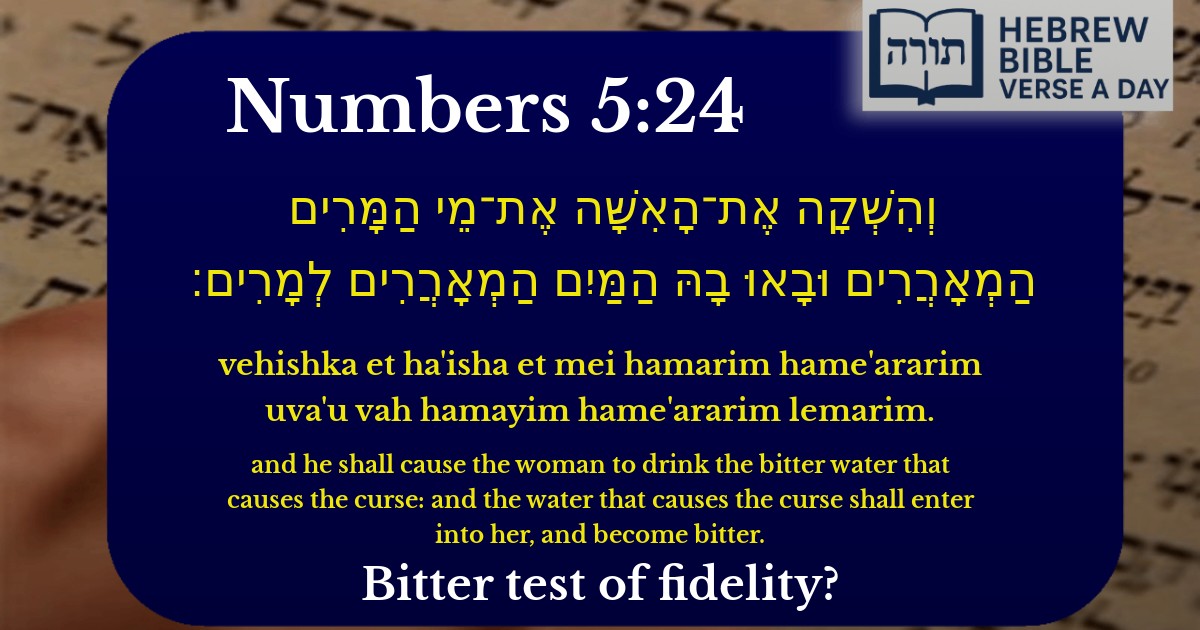Join Our Newsletter To Be Informed When New Videos Are Posted
Join the thousands of fellow Studends who rely on our videos to learn how to read the bible in Hebrew for free!
Hebrew Text
וְהִשְׁקָה אֶת־הָאִשָּׁה אֶת־מֵי הַמָּרִים הַמְאָרֲרִים וּבָאוּ בָהּ הַמַּיִם הַמְאָרֲרִים לְמָרִים׃
English Translation
and he shall cause the woman to drink the bitter water that causes the curse: and the water that causes the curse shall enter into her, and become bitter.
Transliteration
Vehishka et ha'isha et mei hamarim hame'ararim uva'u vah hamayim hame'ararim lemarim.
Hebrew Leining Text
וְהִשְׁקָה֙ אֶת־הָ֣אִשָּׁ֔ה אֶת־מֵ֥י הַמָּרִ֖ים הַמְאָֽרְרִ֑ים וּבָ֥אוּ בָ֛הּ הַמַּ֥יִם הַֽמְאָרְרִ֖ים לְמָרִֽים׃
וְהִשְׁקָה֙ אֶת־הָ֣אִשָּׁ֔ה אֶת־מֵ֥י הַמָּרִ֖ים הַמְאָֽרְרִ֑ים וּבָ֥אוּ בָ֛הּ הַמַּ֥יִם הַֽמְאָרְרִ֖ים לְמָרִֽים׃
🎵 Listen to leining
Parasha Commentary
📚 Talmud Citations
This verse is quoted in the Talmud.
📖 Sotah 7a
The verse is discussed in the context of the ritual of the Sotah (suspected adulteress), where the procedure of drinking the bitter waters is detailed.
📖 Sotah 20a
Further discussion on the effects and implications of the bitter waters as described in the verse.


The Sotah Ritual: Bitter Waters of Testing
The verse describes the procedure of the sotah (suspected adulteress) as outlined in Bamidbar (Numbers) 5:24. This ritual involves a woman suspected of infidelity drinking "bitter waters" (mei hamarim hame'ararim) to determine her guilt or innocence.
Rashi's Explanation
Rashi (on Bamidbar 5:24) explains that the term hame'ararim ("that causes the curse") refers to the Divine Name being erased into the waters, which brings about the curse if the woman is guilty. The waters become "bitter" (lemarim) in her body as a form of divine judgment.
Mishnah and Talmudic Insights
Symbolism of the Bitter Waters
The Midrash (Bamidbar Rabbah 9:14) explains that the bitterness corresponds to the bitter consequences of sin. Just as the waters test the woman's innocence, they also serve as a purification process when she is found innocent.
Halachic Context
The Shulchan Aruch (Even HaEzer 178:1) notes that the sotah ritual was discontinued after the destruction of the Second Temple, as the Sanhedrin no longer functions. However, its lessons about marital fidelity and divine justice remain eternally relevant.